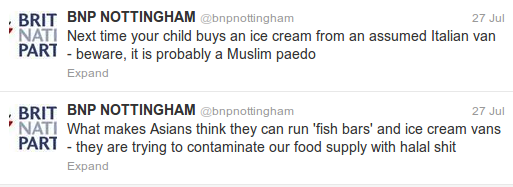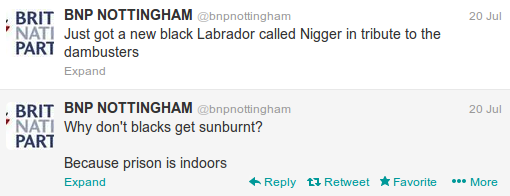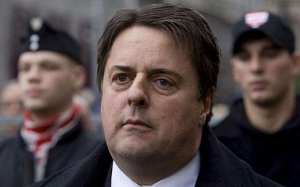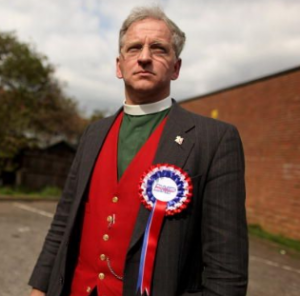The fascists are starting 2014 in a grim place. Tommy Robinson’s desertion of the EDL has left the organisation in a shambles which barely managed to get 200 members to the organisation’s latest national demo in Exeter. EDL members are now outnumbered many times over by antifascists at their demos. As if this woeful state of affairs wasn’t enough, 32 EDL activists were recently jailed for a total of more than 55 years for their involvement in violent disorder at the EDL’s Walsall demonstration. Among those sentenced were Kirk Jones (33 months), Mick Thomas (28 months) and Christopher Boyall (24 months) from Leicestershire and Kirk Reeves from Derbyshire (18 months). They will join the vast majority of the North West Infidels who are already serving time for violent disorder and former EDL leader, Guramit Singh, who will be serving 6 1/2 years for the attempted robbery of a Hucknall garden centre.
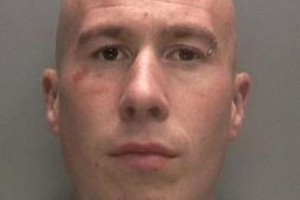
Kirk Jones of Hinkley EDL: three years inside
The BNP has lost almost all of its seats and looks likely to lose the rest this year. Amusingly, Nick Griffin was declared (financially) bankrupt this month and has resorted to filming a white supremacist version of Ready, Steady, Cook! to make ends meet. He is not predicted to hold onto his MEP seat in the North West. The BNP has lost out badly to UKIP’s somewhat less amateurish political campaigning on issues such as immigration.
Various half-witted attempts to Unite the (extreme) Right have been made and all of them have failed badly. Derbyshire ex-EDL has-been, Tony “Tone the Moan” Curtis, joined up with the EVF, South East something-or-other, Casuals Divided and some other even less significant names in the English National Resistance but it all fell apart after only a matter of months when it became clear that there were only 12 of them. Curtis masterminded a demonstration at the University of Nottingham but the 6 men and a dog didn’t even make it onto the campus before surrendering and going to the pub instead.
Meanwhile, Derby BNP organiser Paul Hilliard’s attempts at unity descended into farce when all the different Nazi sects fell out with one another and he gave up in despair. Hilliard, once a BNP superactivist, may now have left the party.
Some important victories were made by anti-fascists on the streets. When the combined shambles of Casuals United, the EVF and other far right hangers-on returned to Brighton for their “March for England” they were literally kicked out of town by a large and militant anti-fascist mobilisation. Likewise, the fading EDL were massively outnumbered by anti-fascists when they returned to Tower Hamlets in September. Militant anti-fascists led a breakaway march which got to the EDL’s route before being kettled by hundreds of police. These mobilisations were the results of considerable hard work by local anti-fascist groups and the Anti-Fascist Network.
It wasn’t all good news though. The murder of serving soldier Lee Rigby by two Islamists in the summer led to an irruption of support for the EDL who exploited the event mercilessly. Large “memorial” events were held by Leicester and Nottingham EDL which were not countered effectively by anti-fascists who had been caught off-guard. Then came the Strong movement, giving racist extremists a soft patriotic veneer to cloak their organising. Mansfield Strong, for example, turned out to be run by long-time EDL activist, Stan Green. Racist abuse against people perceived to be Muslims soared in the aftermath of the Rigby murder, which showed what a reserve of reactionary and racist sentiment exists throughout the country. It is only thanks to the utter incompetence of fascist organisations in the UK that not more damage has been done.
The anti-Islam backlash that the Rigby murder generated culminated in the actions of Pavlo Lapshyn, a racist terrorist who carried out a number of unsuccessful bomb attacks on mosques in the West Midlands as well as murdering an elderly Muslim man. His campaign highlighted once again the growing rise of far-right terrorism in the UK, a phenomenon which is very real, even if reporting on it does not sell papers. In illustration, the year also saw the trial of a “neo-Nazi” Loughborough teenager who plotted massacres and stockpiled home made explosives and weapons.
Another parallel manifestation of the growing reactionary sentiment in the UK was the rise in popularity of UKIP. The party, which panders to racism and xenophobia, did extremely well in local elections winning 16 seats on Lincolnshire County Council alone. Many of these new councillors turned out, unsurprisingly, to have far right views on race and immigration as well as former membership of the BNP and EDL. At present, UKIP poses a much greater threat to values of tolerance and working class solidarity than any of the insignificant openly far right organisations, and is much harder to mobilise against due to the party’s “cleaner” image, supported by extremists and soft patriots alike.
So whilst the “traditional” franchises of far right and fascist politics are in terminal decline, reactionary sentiment, cooked up by a political and media establishment to divide and rule the working class, is alive and well. A growing number of racists are acting alone, to plot bombings and murders at one end of the spectrum, or to perpetrate racially and religiously abusive online attacks at the other. Meanwhile, UKIP provides the possibility of political respectability and a chance of power for people who hate foreignness. The fascists haven’t gone away – they’ve just changed their clothing.
In response anti-fascists need to reassess their strategies. Simply continuing to follow the increasingly demoralised EDL and BNP around the country might make us feel good, but it is not going to stop fascism. The anti-fascist movement is going to have to look for new tactics and new arenas of activity if it wants to remain relevant and effective.







